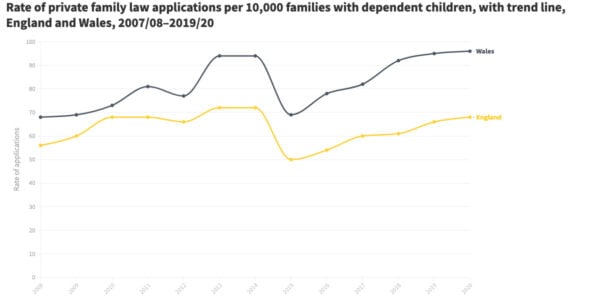Esther Dermott: University of Bristol
Emma Hitchings: University of Bristol
Eleanor Staples: University of Bristol
Dr Heather Ottaway: University of Bristol
Esther Dermott
Emma Hitchings
Eleanor Staples
Dr Heather Ottaway
University of Bristol
University of Bristol
University of Bristol
University of Bristol
This report provides evidence from parents and their children about their experiences when the parents separated. It adds to the programme of evidence developed by Nuffield Family Justice Observatory to increase understanding of private law proceedings in Wales and England (Cusworth et al. 2020, 2021a, 2021b). Although some parents use the family courts, many manage the process of separation without using the courts at all, and in this report, we explore the types of support that families drew on without the need to make applications to the family courts.
The evidence in this report is based on in-depth qualitative data from 42 mothers, fathers and children. The study took place across Wales and south–west England. Participants used video reflections, prompted craft activities and online interviews to explain the decisions they made during the separation, the challenges they faced and the support they received.
Based on a thematic analysis of this data, we offer insights into what parents and children found valuable in managing and adjusting to the separation, as well as their reasons for using, or deciding not to use, the family courts.
Key findings
Separation is a process, not a single event
Parents experienced separation as a process rather than a single event. The families in this study described a wide range of difficulties prior to separation and had exhausted attempts to resolve them before deciding to separate. The decision to separate therefore came after a considerable amount of emotional and relational effort had been used.
- Legal formalisation rarely marked the end of the relationship, whereas living apart, and managing the ongoing emotional and financial aspects, were more salient in parents’ experiences. When children’s needs or parents’ circumstances changed, these markers of the separation required further negotiation.
- For children, the separation was never complete and evolved according to changing circumstances, such as a parent moving house or starting a new relationship, each of which had implications for the other parent. Children’s wishes and feelings also changed over time as they got older and they sometimes desired to spend more or less time with each parent.
Resources make a difference to the separation process
Experiences of separation were significantly shaped by access to resources. Those with access to supportive, informed and well-resourced networks received good levels of support from friends and family, including getting advice or practical help, financial support, or help finding new accommodation from their wider family.
Those with more material resources had increased options for managing the separation. For example, being able to access appropriate housing quickly or being able to pay for legal advice. As a result, they were better able to navigate the practical and emotional challenges of separation.
Those without access to such resources struggled much more in protecting their children from the impact of separation. For example, the availability of suitable housing for the parent moving out had consequences for the quality of the time they spent with their children.
Emotional and relational resources were also key to being able to negotiate with ex-partners. When parents found it hard to manage their distress, conflict and tension could become entrenched, making it more difficult to manage the separation.
Children and young people want to have their voices heard in the separation
The separation of parents affected children both emotionally and practically in their everyday lives. It was an upsetting time, and many found out about their parents’ separation in ways that did not help their understanding, contributing further to their distress.
Children and young people told us they had little information or participation in decisions that affected them. Some older children felt they had not been listened to in relation to court decisions about who they would spend time with, which left them feeling distressed.
Parents aimed to prioritise and protect children through the separation process. They gave examples of how they had attempted to suppress negative emotions towards their ex-partner for the sake of their children, and to resolve disagreements so relationships could be maintained. However, some reflected on how difficult this was while in emotional distress, and there were differences between some parents’ understanding of the impact on children and what children told us themselves.
Parents’ expectations of support are not always matched by their experiences
Parents described experiences of receiving counselling, going to mediation, using solicitors, and going to court – including working with Cafcass and Cafcass Cymru.
Parents appreciated the emotional support they received from counselling, which they valued as a space to process their feelings about the separation. Although there were examples of parents receiving clear information and signposting from mediation, it was more common that mediation was a frustrating and sometimes distressing experience because the information was not clear or realistic, or the mediator was not effectively able to identify and manage the power dynamic between the parents.
When seeking formal advice and guidance, some had good experiences with solicitors – but there were significant barriers to access these because of the cost and unavailability of legal aid. In addition, parents tried to avoid this route because of concerns about potential repercussions in the relationship.
Parents commonly treated court as a ‘last resort’ rather than a means of offering an easy route to dispute resolution. They said that they avoided it, if possible, because of the expense, stress or likelihood of increased conflict in the relationship.
Only a small number of our participants had experience of the court, but although some valued the court orders, most described the process in negative terms. Parents felt it was an alien and intimidating environment with unfamiliar processes. Similarly, children who had experienced court did not feel they had been listened to or believed – although when they felt their Cafcass guardian had listened, their experience was more positive.
Reflections and recommendations
Parents and children valued support that was characterised as accessible, informative, realistic and emotionally aware. The development of new systems of support for families who are separating should consider how well these criteria are met.
Who got what support was quite haphazard, and when parents had few resources to draw on, this made separating even more challenging which impacted negatively on the children. Policy developments should consider how a ‘safety net’ of support can be developed for separating families that includes authoritative information, legal advice and emotional support. Housing support has particular implications for children’s arrangements and should not be overlooked.
Parents worked to protect their children from the distress of the separation, but this did not always match up with what children said they needed in terms of information and involvement in making decisions. More thought needs to be given about how parents are supported to help their children through the process by hearing their wishes and feelings, as well as providing them with age–appropriate information.
The findings concerning mediation suggest we need to think more carefully about the binary model of court or mediation. Parents had mixed experiences of mediation, sometimes related to misplaced expectations, but more concerningly about the way mediation did not address unequal power dynamics in the relationship or domestic abuse that had not been screened effectively. Further efforts to divert families from court could include development of offers beyond mediation, which focus more on advice, guidance and emotional support for parents and their children.
Court was commonly treated by parents as a last resort rather than as a preferred means of resolving disputes. Even though parents appreciated the granting of court orders, the experience of the process was felt to be more negative by parents and children alike. The language and court processes could be reviewed to make a more positive experience and children could be heard earlier in the process to feel their views have helped to influence decisions.
This report was written by
-
 University of Bristol
University of Bristol
Disclaimer:
Nuffield FJO has funded this project, but the views expressed are those of the authors and not necessarily those of Nuffield FJO or the Foundation.







